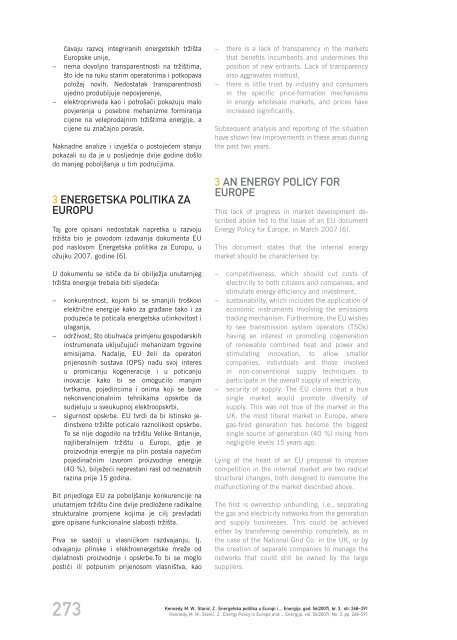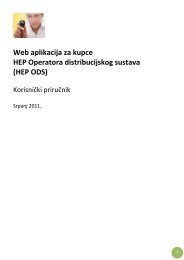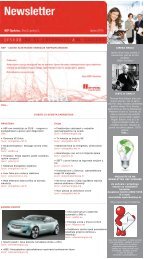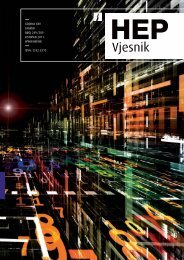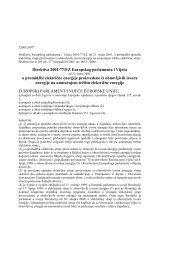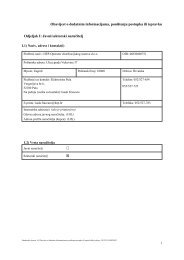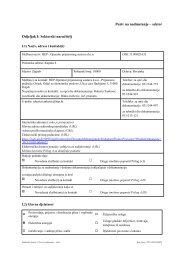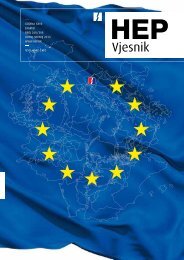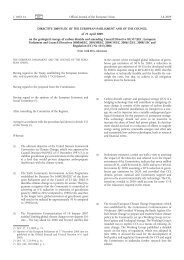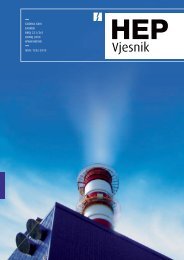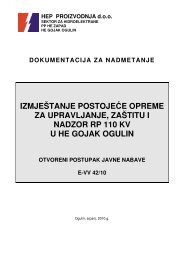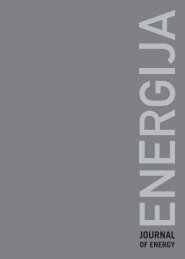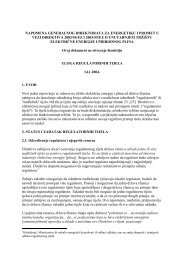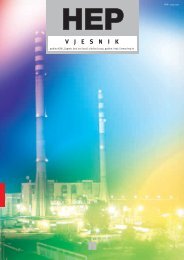Create successful ePaper yourself
Turn your PDF publications into a flip-book with our unique Google optimized e-Paper software.
−<br />
−<br />
Ëavaju razvoj integriranih energetskih træiπta<br />
Europske unije,<br />
nema dovoljno transparentnosti na træiπtima,<br />
πto ide na ruku starim operatorima i potkopava<br />
poloæaj novih. Nedostatak transparentnosti<br />
ujedno produbljuje nepovjerenje,<br />
elektroprivreda kao i potroπaËi pokazuju malo<br />
povjerenja u posebne mehanizme formiranja<br />
cijene na veleprodajnim træiπtima energije, a<br />
cijene su znaËajno porasle.<br />
Naknadne analize i izvjeπÊa o postojeÊem stanju<br />
pokazali su da je u posljednje dvije godine doπlo<br />
do manjeg poboljπanja u tim podruËjima.<br />
3 ENERGETSKA POLITIKA ZA<br />
EUROPU<br />
Taj gore opisani nedostatak napretka u razvoju<br />
træiπta bio je povodom izdavanja dokumenta EU<br />
pod naslovom Energetska politika za Europu, u<br />
oæujku 2007. godine [6].<br />
U dokumentu se istiËe da bi obiljeæja unutarnjeg<br />
træiπta energije trebala biti sljedeÊa:<br />
−<br />
−<br />
−<br />
konkurentnost, kojom bi se smanjili troπkovi<br />
elektriËne energije kako za graappleane tako i za<br />
poduzeÊa te poticala energetska uËinkovitost i<br />
ulaganja,<br />
odræivost, πto obuhvaÊa primjenu gospodarskih<br />
instrumenata ukljuËujuÊi mehanizam trgovine<br />
emisijama. Nadalje, EU æeli da operatori<br />
prijenosnih sustava (OPS) naappleu svoj interes<br />
u promicanju kogeneracije i u poticanju<br />
inovacije kako bi se omoguÊilo manjim<br />
tvrtkama, pojedincima i onima koji se bave<br />
nekonvencionalnim tehnikama opskrbe da<br />
sudjeluju u sveukupnoj elektroopskrbi,<br />
sigurnost opskrbe. EU tvrdi da bi istinsko jedinstveno<br />
træiπte poticalo raznolikost opskrbe.<br />
To se nije dogodilo na træiπtu Velike Britanije,<br />
najliberalnijem træiπtu u Europi, gdje je<br />
proizvodnja energije na plin postala najveÊim<br />
pojedinaËnim izvorom proizvodnje energije<br />
(40 %), biljeæeÊi neprestani rast od neznatnih<br />
razina prije 15 godina.<br />
Bit prijedloga EU za poboljπanje konkurencije na<br />
unutarnjem træiπtu Ëine dvije predloæene radikalne<br />
strukturalne promjene kojima je cilj prevladati<br />
gore opisane funkcionalne slabosti træiπta.<br />
Prva se sastoji u vlasniËkom razdvajanju, tj.<br />
odvajanju plinske i elektroenergetske mreæe od<br />
djelatnosti proizvodnje i opskrbe.To bi se moglo<br />
postiÊi ili potpunim prijenosom vlasniπtva, kao<br />
−<br />
−<br />
there is a lack of transparency in the markets<br />
that benefits incumbents and undermines the<br />
position of new entrants. Lack of transparency<br />
also aggravates mistrust,<br />
there is little trust by industry and consumers<br />
in the specific price-formation mechanisms<br />
in energy wholesale markets, and prices have<br />
increased significantly.<br />
Subsequent analysis and reporting of the situation<br />
have shown few improvements in these areas during<br />
the past two years.<br />
3 AN ENERGY POLICY FOR<br />
EUROPE<br />
This lack of progress in market development described<br />
above led to the issue of an EU document<br />
Energy Policy for Europe, in March 2007 [6].<br />
This document states that the internal energy<br />
market should be characterised by:<br />
−<br />
−<br />
−<br />
competitiveness, which should cut costs of<br />
electricity to both citizens and companies, and<br />
stimulate energy efficiency and investment,<br />
sustainability, which includes the application of<br />
economic instruments involving the emissions<br />
trading mechanism. Furthermore, the EU wishes<br />
to see transmission system operators (TSOs)<br />
having an interest in promoting cogeneration<br />
of renewable combined heat and power and<br />
stimulating innovation, to allow smaller<br />
companies, individuals and those involved<br />
in non-conventional supply techniques to<br />
participate in the overall supply of electricity,<br />
security of supply. The EU claims that a true<br />
single market would promote diversity of<br />
supply. This was not true of the market in the<br />
UK, the most liberal market in Europe, where<br />
gas-fired generation has become the biggest<br />
single source of generation (40 %) rising from<br />
negligible levels 15 years ago.<br />
Lying at the heart of an EU proposal to improve<br />
competition in the internal market are two radical<br />
structural changes, both designed to overcome the<br />
malfunctioning of the market described above.<br />
The first is ownership unbundling, i.e., separating<br />
the gas and electricity networks from the generation<br />
and supply businesses. This could be achieved<br />
either by transferring ownership completely, as in<br />
the case of the National Grid Co. in the UK, or by<br />
the creation of separate companies to manage the<br />
networks that could still be owned by the large<br />
suppliers.<br />
273<br />
Kennedy,<br />
M. W., StaniÊ, Z., Energetska politika u Europi i..., Energija, god. 56(2007), br. 3., str. 268∑291<br />
Kennedy, M. W., StaniÊ, Z., Energy Policy in Europe and..., Energija, vol. 56(2007), No. 3, pp. 268∑291


